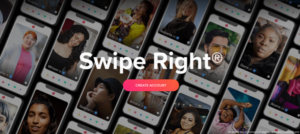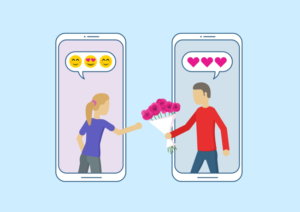Virtual and Reality Identity of Online Dating
Have you ever considered meeting your soulmate online? Have you tried the little swipe and then boom the sparkly “match” on the screen and met your perfect another half? Dating app has been a popular way of meeting people in the 21st century. According to the Actor-Network Theory(ANT) (Latour, B. 2005), this is the perfect interpretation of human and non-human assemble. It comes from the intention of building human interaction, by the means of machines and ends up on human interaction relationship again. “The dating app designed to be deleted,” says Hinge. Today we will be seeing from the micro-sociological way of understanding the virtual and real identity of online dating situations and why it might have its hinder sight for finding your life partner.

Online Dating Site Starting Page, https://tinder.com/
To start off with the digital identity online when it comes to online dating, the unmatching identity from online to offline through the internet is the primary identity difference. Not only wanting to build an intimate relationship, trying to communicate through machines and online has created this façade that people have grown fear to. Goffman, E draws people online as the audience and performers are all situational based and constantly putting a mask on (1959). We are curating how we want to be viewed online by digital profile. The exhibitional approach of “we are all curators of our identity on social media” (Hogan, B. 2010) is also pointing out how virtual identity can be manipulated easily. Online identity on dating sites can be easily portrayed in a much more attractive or culturally accepted way for a better user experience. Balancing the ideal and authentic self and expecting the accuracy between these two through self-triangulation, is necessary (Davis, J. L. 2014). Though the beautified profile inheritably will increase the chance of being called out “cat-fishing”. Bearing this untrustworthy feeling towards strangers online will pre-planted negative thoughts and increase the chances of a self-defense system. Building relationship in a real-world setting relatively has less misrepresenting of their attributes (Finkel, E. J. et al. 2012) by facing each other, provides chances for closer observation on facial expression, poses, tone of speaking and positively influence on human interaction.
Moreover, the anonymity set of digital identity on dating apps. At the beginning stage of Hinge, it has the function of matching only people who have friends in common on Facebook (News: Hinge is ditching the Facebook login requirement). This relatively would provide an assured basic credential for digital identity and real-world identity. Current online dating apps are trying to attract traffic by the algorithm and a large number of choices by the concept of meeting strangers. The uncertainty of assured identity would increase the potential guarding system, especially on women.

Illustration of Online Dating, by Petrborn, credit Getty Images/iStockphoto
What shall we do about the virtual and real-world identity of dating apps? Most importantly, how can we increase the chance of meeting the life partner through identity interaction?
- Try to be yourself and not compare with others through beautifying yourself. You are online to find your “partner in crimes”, not for others! Self is both a psychotic and social phenomenon that came from social experiences (Leary, M. R. & Tangney, J. P. 2011). Try your best to connect your inner self and the outside world, then you will find a better way of communicating with the world!
- Communicate effectively online and offline. Initiate the date when you have a general feeling for this person. Don’t drag too long! Breaking the apparent gap between the virtual and real-world is the easiest approach to start building a meaningful relationship.
- Do the background check if you can for your own safety and confidence! Online search engine sometimes has more information than people are expecting. The study has shown people who use uncertainty reduction strategies for example googling or asking friends, tend to disclose more personal information and have more courage of self-efficacy (Gibbs, J. L., Ellison, N. B. and Lai, C.-H. 2011). This can be a potentially positive effect on interpersonal relationship building.
- Stop portraying everyone as serial killers! We are all normal people and let’s enjoy the meetup!
References:
Davis, J. L. (2014) Triangulating the Self: Identity Processes in a Connected Era. Symbolic interaction. [Online] 37 (4), 500–523.
Finkel, E. J. et al. (2012) Dating in a Digital World. Scientific American mind. [Online] 23 (4), 26–33.
Gibbs, J. L., Ellison, N. B. and Lai, C.-H. (2011) ‘First Comes Love, Then Comes Google: An Investigation of Uncertainty Reduction Strategies and Self-Disclosure in Online Dating’, Communication Research, 38(1), pp. 70–100. doi: 10.1177/0093650210377091.
Goffman, E. (1959) The presentation of self in everyday life /. Harmondsworth :: Penguin,.
Hogan, B. (2010) ‘The Presentation of Self in the Age of Social Media: Distinguishing Performances and Exhibitions Online’, Bulletin of Science, Technology & Society, 30(6), pp. 377–386. doi: 10.1177/0270467610385893.
Latour, B. (2005) Reassembling the social : an introduction to actor-network-theory / Bruno Latour. Oxford: Oxford University Press.
Leary, M. R. & Tangney, J. P. (2011) Handbook of self and identity edited by Mark R. Leary, June Price Tangney. Second edition. New York: Guilford Publications.




Recent comments